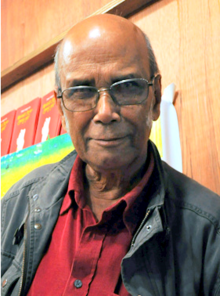Syed Shamsul Haque
This article needs additional citations for verification. (January 2017) |
Syed Shamsul Haq | |
|---|---|
সৈয়দ শামসুল হক | |
 | |
| Born | 27 December 1935 |
| Died | 27 September 2016 (aged 80) Dhaka, Bangladesh |
| Nationality | Bangladeshi |
| Occupation | Writer |
| Years active | 1954–2016 |
| Spouse | Anwara Syed Haq |
| Children | Bidita Sadiq (daughter) Ditio Syed-Haq (son) |
| Parents |
|
| Relatives | Syed Raisuddin (grandfather) |
| Awards | full list |
Syed Shamsul Haq (27 December 1935 – 27 September 2016) was a Bangladeshi writer.[1] He was awarded Bangla Academy Literary Award in 1966 (the youngest among all to receive it), Ekushey Padak in 1984 and Independence Day Award in 2000 by the Government of Bangladesh for his contributions to Bangla literature.[2] His notable works include "Payer Awaj Pawa Jai", "Nishiddho Loban", "Khelaram Khele Ja", "Neel Dongshon" and "Mrigoya".[3]
Early life
[edit]Haq was born in Kurigram on 27 December 1935 to Syed Siddique Husain, a homeopathic physician, and Halima Khatun.[4] He was the eldest of the eight children.[3] In 1951, he went to Bombay to work as an assistant to film director Kamal Amrohi while he was making his film Mahal but left the job the next year.[5]
Personal life
[edit]Haq was married to Anwara Syed Haq. She is a member of the Royal College of Psychiatrists in London.[4] Together they have one daughter, Bidita Sadiq, and one son, Ditio Syed-Haq.[2][6]
On 27 September 2016, he died of lung cancer at the age of 80 in Dhaka.[7]
Work
[edit]Haq wrote poetry, fiction, plays (mostly in verse), music lyrics and essays. His literary works were included in the curriculum of school level, secondary, higher secondary and graduation level Bengali literature in Bangladesh.
Haq also wrote songs, including "Jar Chaya Poreche Monero Aynate" and "Haire Manush Rongin Fanush".[2]
- Poetry
- Ekoda Ek Rajje (1961)
- Boishekhe Rochito Ponktimala (1969)
- Birotihin Utsob (1969)
- Protidhonigon (1976)
- Opor Purush (1978)
- Kobita Samagra (2007)
- Ek Ascharja Sangamer Smriti
- Poraner Gohin Vitor
- Novels
- Ek Mahilar Chhobi (1959)
- Anupam Din (1962)
- Simana Chhariye (1964)
- Neel Dangshon (1981)
- Smritimedh (1986)
- Mrigayay Kalakshep (1986)
- Stabdhatar Anubad (1987)
- Ek Juboker Chhayapath (1987)
- Swapna Sankranta (1989)
- Brishti O Bidrohigon (1996)
- Baro Diner Shishu (1989)
- Banabala Kichu Taka Dhar Niyechhilo (1989)
- Trahi (1989)
- Tumi Sei Tarbari (1986)
- Kayekti Manusher Sonali Jouban (1989)
- Shreshtho Uponyas (1990)
- Nirbasita (1990)
- Nishiddha Loban (1990)
- Khelaram Khele Ja (1991)
- Megh O Machine (1991)
- Iha Manush (1991)
- Mahashunye Poran Master
- Dwitiya Diner Kahini
- Balikar Candrojan
- Ayna Bibir Pala
- Kaldharma
- Duratwa
- Na Jeyo Na
- Onya Ek Alingan
- Ek Mutho Janmabhumi
- Bukjhim Bhalobasa
- Acena
- Alor Jonyo
- Rajar Sundari
- Gupta Jibon Prakashya Mritu
- Chokebazi
- Duder Galase Nil Machi
- Jesmin Road
- Khelaram Khele Ja
- Stories
- Tash (1954)
- Seet Bikel (1959)
- Rokto Golap (1964)
- Anonder Mrittu (1967)
- Collected Short Stories (2006)
- Films
- Phir Milengey Hum Dono (1966), screenwriter and director[8]
- Plays
- Payer Awaj Paoa Jay
- Nuruldiner Sara Jibon
- Ekhane Ekhon
- Ganonayaka
- Eersha
- Narigon
- Uttarbangsha
- Khatta Tamasha
- Judhha ebong Judhha
- Collected Verse plays
- Collected plays
- Banglar Mati Banglar Jol
- Translations
Awards
[edit]- Bangla Academy Literary Award (1966)
- Adamjee Literary Award (1969)
- Alakta Gold Medal (1982)
- Alaol Literary Award (1983)
- Kabitalap Award (1983)
- Literary Award of the Association of Women Writers
- Ekushey Padak (1984)
- TENAS Medal (1990)
- Jebunnessa-Mahbubullah Gold Medal (1985)
- Padabali Kabita Award (1987)
- Nasiruddin Gold Medal (1990)
- National Poetry Award (1997)
- Independence Day Award (2000)
- National Poetry Honour (2001)
- Premchand Fellowship of Sahitya Akademi of India (2010)[9]
References
[edit]- ^ "Intellectuals for erasing communal forces". Daily Star. 2 March 2004. Retrieved 22 September 2011.
- ^ a b c Hossain, Rafi (8 October 2016). "The Late Legendary Littérateur". The Daily Star. Retrieved 8 October 2016.
- ^ a b ২০১৬: শিল্প সাহিত্য অঙ্গন যাঁদের হারিয়েছে. The Daily Star (in Bengali). 29 December 2016. Retrieved 5 January 2017.
- ^ a b "About Shamsul Haque". jaleshwari. Archived from the original on 1 December 2010. Retrieved 9 December 2012.
- ^ Kar, Amitava (30 August 2013). "A polymath of our time". The Daily Star. Retrieved 8 November 2017.
- ^ "Prime Minister Sheikh Hasina visits cancer-hit author Syed Shamsul Haq, to foot his medical bill". bdnews24.com.
- ^ "Syed Shamsul Haq passes away". The Daily Star. 27 September 2016. Retrieved 27 September 2016.
- ^ Sitab, Tahmin (27 September 2017). "Syed Shamsul Haque- The unmatched lyricist of Bangla Cinema". Dhaka Tribune.
- ^ "Premchand Fellowship Winners". Sahitya Akademi of India. Retrieved 24 June 2021.
Further reading
[edit]- Golpo Songroho (Collected Stories), the national textbook of B.A. (pass and subsidiary) course of Bangladesh, published by University of Dhaka in 1979 (reprint in 1986).
- Bangla Sahitya (Bengali Literature), the national textbook of intermediate (college) level of Bangladesh published in 1996 by all educational boards.
- Syed Shamsul Haq (https://en.bdnovels.org/361/)
External links
[edit]- 1935 births
- 2016 deaths
- Bangladeshi male poets
- Bengali male poets
- Bengali-language poets
- Bangladeshi critics of religions
- Recipients of the Ekushey Padak
- Recipients of the Independence Day Award
- Best Screenplay National Film Award (Bangladesh) winners
- Recipients of Bangla Academy Award
- Recipients of the Adamjee Literary Award
- Deaths from lung cancer in Bangladesh
